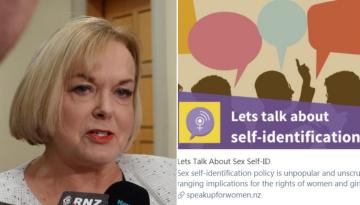
Warning: This article discusses suicide.
Georgina Beyer knows all about breaking barriers - becoming the first transgender MP in the world. But what is her biggest regret as a Māori MP in Parliament?
"A disaster, an absolute nightmare... it was one of the largest proposed confiscations from Māori, in modern times".
The former Labour Party MP describes the fallout over the Foreshore and Seabed legislation to Matangireia presenter Scott Campbell.
Beyer never shies away from the painful path she took to becoming one of New Zealand's most trailblazing politicians.
Beyer's list of achievements are extensive - a drag queen, a sex worker, an actor, an activist, a Mayor, and a MP.
In fact, when elected in 1999, she was the world's first transgender Member of Parliament, becoming known for her bold and colourful exterior.
But her story is one of pain, adversity, and fear - and it's also one of courage and bravery.
Beyer was born George. Her biological father was a policeman who was sent to jail, leaving her mother to fend for herself and two young children.
Raised by her grandparents, until her mother remarried, she describes life in the Beyer household as "mildly well-off". Her stepfather Colin was a barrister and solicitor.
From around four years old, Beyer started to secretly express her feminine side through theatre, dressing up and acting.
"If I was caught or discovered, or anything like that, it would be dealt with physical punishment, corporal punishment - beatings, hidings, things like that, to beat it out of me."
At 16 years old, George became Georgina, but the abuse followed her from home to the streets.
As a sex worker, she was confronted daily with physical and verbal abuse from members of the public.
"It drove me to suicide... to attempt suicide on three times, in my young life," Beyer said, "I had been pack-raped in Sydney in 1979, which was a terrifying, horrifying experience, and the law didn't defend me."
After working in a gay night club in Auckland, she moved from the glitzy lights of Karangahape Road to conservative back blocks of the Wairarapa.
It was in Carterton Beyer's career in politics began.
Working as a part-time radio announcer (alongside Paul Henry, who she later beat in the 1999 General Election), she decided to run for council.
She missed out, but she tried again, and again. Eventually becoming a councillor and, in 1995, the Mayor of Carterton.
"I'm the Mayor, okay, where's the handbook on this job?" she said, "There isn't any, but I now was in this position and I thrived in it, absolutely thrived in it."

Being eloquent and not afraid to speak her mind, Parliament beckoned next.
Standing for the Labour Party in 1999, Beyer won the safe blue seat of Wairarapa with a majority of 3,033 votes. She was the first transgender woman elected to office.
However, in 2004, she faced one of the toughest challenges of her life. To choose her party, or her people.
"Oh, a disaster, an absolute nightmare".
The Government, under Helen Clark, had just announced the Foreshore and Seabed legislation, effectively removing Māori claims to ownership over beaches and waterways.
The news came as a shock to the Labour Party's Māori caucus.
"We were all quite taken aback that an announcement had been made, with no consultation with anyone in the Māori caucus.
"At the end of day, it was one of the largest proposed confiscations from Māori in modern times".
One by one, the Māori caucus "fell into line". The last three to do so were Beyer, Nanaia Mahuta, and Tariana Turia.
Beyer didn't hold a Māori constituency and felt she had no mandate from Māori to speak up strongly on their behalf like the rest of her Māori colleagues.
"I was just so torn, but actually I didn't have to be steeped in tikanga Māori to understand that this was wrong, wrong, wrong.
"I vowed and declared from that time on that I would never be torn between who and what I am as far as my heritage is concerned, and political expediency".
So, what did she think of the former Prime Minister Helen Clark?
"I was never very close to Helen, at all, really," Beyer said.
"I was not within her inner, outer, or extra-outer circle, really. I was just a cannon fodder backbench MP".
She became further isolated when she asked to abstain from the vote.
"I can almost pinpoint my beginning of the end of my political career in Parliament on that Foreshore and Seabed thing. I felt defeated and I felt impotent."
But that wasn't the end.
She stayed for another two years traveling to Parliaments across the world to talk on gender issues.
Reflecting on her story today, she's proud of the road she's taken.
"You can't live in your victim-hood all the time, you can't wallow in it, you gotta learn from it. Move on and change it and change what created that."
"And I hope I've been able to do a bit of that".
RNZ


